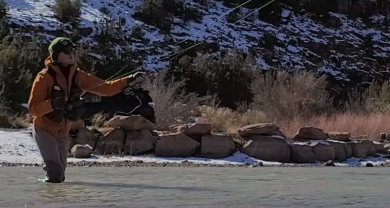
ON SALE
Hareline Dubbin Inc
Genuine Fly Lipps
SKU #939-205705
$4.95
$5.94
$0.99
Free shipping over $45
NOTE: This item ships separately.
You May Also Like
Description
Overview
Tie a FlyLipp into one of your favorite patterns and watch what happens. Suddenly, your fly swims up, swims down, darts from side-to-side. And the topwater bite? Unheard of. The action produced by FlyLipps is dramatic"”and effective.Read More +Features
- Use your favorite loop knot to tie the fly to the tippet
- To prevent line twists, and to ensure proper fly action, we strongly recommend fishing lipped flies with a small (#10) barrel swivel between the tippet and the rest of the leader.
- Lipped flies have plenty of action. Slower retrieves sometimes work better. Experiment
- You can vary the amount of action a fly has by trimming the FlyLipp or tying a fuller/longer tie. Decrease action by trimming the FlyLipp with nail clippers. Try to trim the FlyLipp as symmetrical as possible.
- Many species of fish seem to hit topwater flies just below the surface. After a few quick “pops,” allow the fly to sink and strip a few times swimming the fly just below the surface.
- Since Lipped flies tied ascending style rise more quickly than other flies, they are less likely to get hung on structure or debris near the bottom
- Experiment with floating, intermediate, and sinking lines. For example, topwater flies on an intermediate sinking line can cover the water column more efficiently
- When fishing subsurface patterns using a quick retrieve, decrease the size of the Lipp. This will enable the fly to maintain a subtle fluttering of the “tail” during rapid retrieves.
WARNING: Cancer and Reproductive Harm - www.P65Warnings.ca.gov











